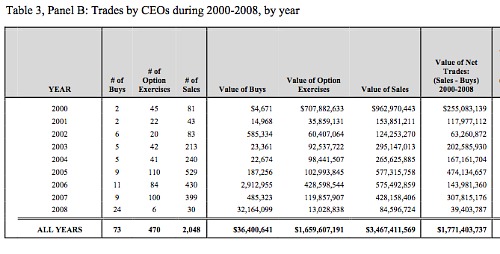This is one of the more disturbing stories I’ve read in a while. So far, no one in the mainstream press has touched it with the exception of Forbes‘s Andy Greenberg. That needs to change quickly.
ThinkProgress reports that private security companies solicited by the U.S. Chamber of Commerce’s law firm proposed a ratfuck operation to discredit political opponents of the business lobby:
According to one document prepared by Team Themis, the campaign included an entrapment project. The proposal called for first creating a “false document, perhaps highlighting periodical financial information,” to give to a progressive group opposing the Chamber, and then to subsequently expose the document as a fake to undermine the credibility of the Chamber’s opponents. In addition, the group proposed creating a “fake insider persona” to “generate communications” with Change to Win.
The Tech Herald reported earlier that the same companies, HB Gary Federal, Palantir Technologies, and Berico Technologies, had pitched a similar operation to Bank of America to discredit Wikileaks and journalist supporters like Salon’s Glenn Greenwald.
Here’s Greenwald on them (emphasis mine):
For one thing, it turns out that the firms involved here are large, legitimate and serious, and do substantial amounts of work for both the U.S. Government and the nation’s largest private corporations (as but one example, see this email from a Stanford computer science student about Palantir).
Indeed:
And perhaps most disturbing of all, Hunton & Williams was recommended to Bank of America’s General Counsel by the Justice Department — meaning the U.S. Government is aiding Bank of America in its defense against/attacks on WikiLeaks.
This all came out in the open because an HB Gary Federal executive blabbed his mouth to the Financial Times last week about taking down the hacker group Anonymous. Anonymous promptly hacked that company’s email system and released 50,000 emails. That’s the only reason this report came to light.
The critical questions, obviously, are whether Bank of America and the Chamber signed off on any of this nuttiness. But we also need the press looking closely at these companies, and particularly HB Gary Federal and its government connections, like now.
Read the proposed smear plan here (on the Wikileaks site, naturally).
— Simon Johnson points to a study of stock sales by the CEOs of fourteen major financial institutions.
The key finding is that CEOs were “30 times more likely to be involved in a sell trade compared to an open market buy trade” of their own bank’s stock and “The dollar value of sales of stock by bank CEOs of their own bank’s stock is about 100 times the dollar value of open market buys”…
Interestingly, CEOs in the smallest banks in their sample did not sell much stock relative to their purchases of their own bank’s stock.
It also finds that the CEOs of these fourteen companies cashed out $2.6 billion worth of stock from 2000 to 2008.
Johnson doesn’t note this but even more interesting is Table 3 from the report by Sanjai Bhagat and Brian Bolton: It shows that CEOs accelerated their stock sales dramatically as the bubble inflated:

As Johnson says in his headline, the key question is:
What Did Bank CEOs Know And When Did They Know It?
— For your weekend reading pleasure, see Adam Gopnik’s excellent essay in The New Yorker on “How the Internet gets inside us.”
He reviews books like The Shallows and Cognitive Surplus and winds his way between the technophiles and technophobes, pointing out where their theories are too neat.
A social network is crucially different from a social circle, since the function of a social circle is to curb our appetites and of a network to extend them. Everything once inside is outside, a click away; much that used to be outside is inside, experienced in solitude. And so the peacefulness, the serenity that we feel away from the Internet, and which all the Better-Nevers rightly testify to, has less to do with being no longer harried by others than with being less oppressed by the force of your own inner life. Shut off your computer, and your self stops raging quite as much or quite as loud.
It is the wraparound presence, not the specific evils, of the machine that oppresses us. Simply reducing the machine’s presence will go a long way toward alleviating the disorder. Which points, in turn, to a dog-not-barking-in-the-nighttime detail that may be significant. In the Better-Never books, television isn’t scanted or ignored; it’s celebrated. When William Powers, in “Hamlet’s BlackBerry,” describes the deal his family makes to have an Unplugged Sunday, he tells us that the No Screens agreement doesn’t include television: “For us, television had always been a mostly communal experience, a way of coming together rather than pulling apart.” (“Can you please turn off your damn computer and come watch television with the rest of the family,” the dad now cries to the teen-ager.)
Yet everything that is said about the Internet’s destruction of “interiority” was said for decades about television, and just as loudly.
Read the whole thing.
Ryan Chittum is a former Wall Street Journal reporter, and deputy editor of The Audit, CJR’s business section. If you see notable business journalism, give him a heads-up at rc2538@columbia.edu. Follow him on Twitter at @ryanchittum.
